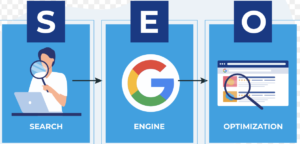Do you want your website to rank higher on search engines? If so, understanding what SEO is and how it works is crucial. SEO, or Search Engine Optimization, is the process of optimizing your website to increase its visibility and organic traffic from search engine results. By implementing various strategies and following search engine guidelines, you can improve your website’s rankings and attract more potential customers.

What is SEO
Why is SEO important?
In today’s digital age, where online presence is paramount, having a strong SEO strategy is essential for any business or website owner. Here are a few reasons why SEO is important:
- Increased visibility: When your website ranks higher in search engine results, it becomes more visible to potential customers. Studies have shown that most users do not go beyond the first page of search results, so if your website doesn’t appear there, you may be missing out on valuable traffic.
- Organic traffic: Unlike paid advertising, which requires continuous investment, organic traffic gained through SEO is free. By optimizing your website for search engines, you can attract visitors who are actively searching for the products or services you offer, increasing the chances of converting them into customers.
- Credibility and trust: Websites that rank higher in search results are often perceived as more trustworthy and credible. By implementing SEO best practices, you can build a solid reputation for your website and establish yourself as an authority in your industry.
How search engines work
To understand SEO, it’s important to grasp how search engines work. Search engines like Google use complex algorithms to determine the most relevant and high-quality websites to display in their search results. Here’s a brief overview of the process:
- Crawling: Search engine bots, also known as spiders or crawlers, systematically crawl the web, discovering and indexing web pages. These bots follow links from one page to another, collecting information about each page they visit.
- Indexing: After crawling a web page, search engines index the information they’ve gathered. This allows them to retrieve relevant results quickly when a user searches for a particular query.
- Ranking: When a user enters a search query, search engines analyze their index to determine which pages are most relevant to the query. Several factors influence rankings, including the page’s content, relevance, authority, and user experience.
On-page SEO optimization techniques
On-page SEO refers to optimizing elements on your website to improve its visibility and rankings. Here are some key on-page optimization techniques to consider:
- Keyword research: Conduct thorough keyword research to identify the terms and phrases your target audience is searching for. Use these keywords strategically in your website’s content, including headings, titles, and meta descriptions.
- Meta tags: Optimize your meta tags, including the meta title and meta description, to provide concise and compelling summaries of your web page’s content. These tags appear in search engine results and can significantly impact click-through rates.
- URL structure: Create clean and descriptive URLs for your web pages. Including relevant keywords in your URLs can improve both user experience and search engine rankings.
Off-page SEO optimization techniques
While on-page SEO focuses on optimizing elements on your website, off-page SEO refers to activities that take place outside of your website to improve its visibility and authority. Here are some off-page optimization techniques to consider:
- Link building: Acquiring high-quality backlinks from authoritative websites can significantly boost your website’s rankings. Focus on building natural and relevant links through guest blogging, influencer outreach, and creating shareable content.
- Social media marketing: Engage with your audience on social media platforms to increase brand visibility and attract more traffic to your website. Sharing your content on social media can also help generate backlinks and improve your website’s authority.
- Online reputation management: Monitor and manage your online reputation by actively responding to reviews, addressing customer concerns, and maintaining a positive brand image. Positive reviews and a strong online presence can have a positive impact on your website’s rankings.
The role of keywords in SEO
Keywords play a vital role in SEO as they act as the bridge between what users are searching for and the content on your website. Here are a few key aspects to consider when using keywords:
- Keyword research: Start by identifying relevant keywords using keyword research tools. Look for keywords with high search volume and low competition to maximize your chances of ranking well.
- Keyword placement: Once you have identified your target keywords, strategically integrate them into your website’s content. However, avoid keyword stuffing, as search engines penalize websites that engage in this practice.
- Long-tail keywords: Consider targeting long-tail keywords, which are longer and more specific phrases. While they may have lower search volume, they often have higher conversion rates, as they reflect users with clearer intent.
SEO tools and resources
To effectively implement SEO strategies, it’s important to leverage the right tools and resources. Here are some commonly used SEO tools that can help you optimize your website:
- Google Analytics: A powerful analytics tool that provides valuable insights into your website’s performance, including traffic sources, user behavior, and conversion rates.
- Google Search Console: This tool helps you monitor and maintain your website’s presence in Google’s search results. It provides valuable data on search traffic, indexing issues, and website errors.
- Keyword research tools: Tools like SEMrush, Moz, and Ahrefs offer comprehensive keyword research data, including search volume, competition, and related keyword suggestions.
Common SEO mistakes to avoid
While SEO can be highly effective, it’s important to avoid common mistakes that could hinder your website’s rankings. Here are a few common SEO mistakes to watch out for:
- Keyword stuffing: Stuffing your content with excessive keywords can result in a poor user experience and can lead to search engine penalties.
- Ignoring mobile optimization: With the rise of mobile usage, optimizing your website for mobile devices is crucial. Failure to do so can negatively impact your rankings and user experience.
- Neglecting user experience: Search engines prioritize websites that provide a positive user experience. Factors like page load speed, mobile-friendliness, and intuitive navigation should not be overlooked.
The future of SEO
As technology continues to evolve, so does SEO. Here are a few trends that are shaping the future of SEO:
- Voice search optimization: With the increasing popularity of voice assistants, optimizing your website for voice search queries will become increasingly important.
- Artificial intelligence and machine learning: Search engines are becoming smarter, relying on AI and machine learning to deliver more personalized and relevant search results.
- User experience optimization: Websites that prioritize user experience will continue to outperform competitors in search engine rankings. Factors like page load speed, mobile optimization, and intuitive navigation will play a crucial role.
Conclusion
In conclusion, SEO is a powerful strategy that can significantly improve your website’s visibility, attract organic traffic, and boost your online success. By understanding the importance of SEO, the workings of search engines, and implementing effective optimization techniques, you can take your website to new heights. Remember to conduct thorough keyword research, optimize both on-page and off-page elements, and stay up to date with the latest SEO trends. With a solid SEO strategy in place, you can drive traffic, increase conversions, and maximize your online presence. So, start implementing SEO best practices today and unlock the full potential of your website.

